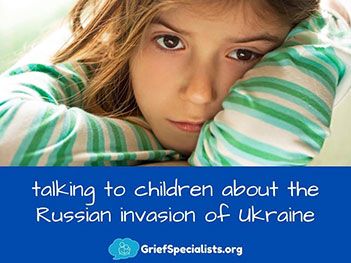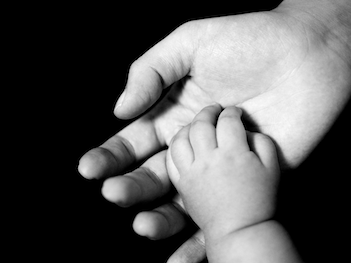Talking to Children about the Russian Invasion of Ukraine
2 March, 2022

Children pick up and hear far more than we give them credit for. They hear snippets of adult conversations and can hear the news blaring from television sets and radios. When they’re at school, they may hear other children talking about the war. Put it this way, it will remain hard to shield them from what is happening.
Children’s recent experience of war on television news will have been from faraway places that are not familiar to them. Now in Ukraine they see a modern city that could be where they live. We can honestly reassure them that what they are seeing there is not going to happen to them now, because Ukraine is a long way away.
It’s not realistic to protect children from everything sad or frightening in life. What we can do is give them the right tools to deal with emotional pain and feelings of loss of safety and control – or put another way, feelings of grief. Even when we can’t control outside events, we can control how we talk and listen to our children.
You’ll have to make a judgement about your children’s maturity and ability to understand without giving them nightmares and talk to them where they are at. However, tell the truth about your feelings and go first, which will then make it safe for your children to talk honestly, too. There is a caveat to this. It’s easy, in our enthusiasm to get it right, to say too much about our own feelings, and put ideas into our child’s head that they hadn’t thought of. Answer questions your child has honestly, but stop at the answer, don’t explain further. They will come back when they have absorbed the first answer, with more questions if they need to.
DO
- Tell the truth about how you feel. It will make it safe for your child to do the same.
- Recognise that grief is emotional, not intellectual. Feeling sad or scared are normal and natural.
- Remember that every child has a unique perception about what they hear and believe about wars.
- Explain your beliefs about the invasion clearly and openly to your children.
- Tell them you don’t have all the answers, don’t lie.
- Be Patient. Give your child time to form their own opinions.
- Actually sit and show you are listening, not whilst you are cooking the dinner!
- Listen with your heart, not your head. Allow children to share their emotions without judgement or criticism.
- Ration the news to limit the amount they are exposed to, and if possible, watch it together, so you can answer any of their questions, and any fears and anxieties can be shared. There’s a fine line between needing to know what’s happening and listening to ongoing hype and speculation.
- Children may not have the words to voice their fears, or may feel silly in expressing them. Some may even be protecting the grown-ups from their nightmarish fantasies. You may have to do a bit of tentative mind-reading to help them frame what they want to say.
DON’T
- Don’t say “Don’t feel scared.” Fear is a normal and common response to scary situations.
- Don’t say “Don’t feel sad.” Sadness is a healthy and normal reaction to the possibility of someone they know getting ill.
- Don’t act strong for your children. It gives them the message that they must be strong too, which means they will hide their normal and natural feelings.
- Don’t compare their lives or situations to others in the world. -Comparison minimises their feelings.
- Don’t make promises that you cannot keep. Instead of saying “Everything’s going to be okay,” say, “We’ll do everything we can to be safe.”
Try something like:
“I was frightened when I heard the news about what’s happening in Ukraine. I was worried for our safety and I was sad for the people who have been affected.”
-Remember, children are smart little cookies! They see and hear more than we think they do. Treat their feelings with the same respect and dignity that you want to receive.
If you need support, we have specialists all over the country who can help you, and we are there to chat on our social media pages.








